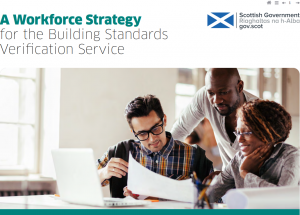Building Standards
Building Standards Workforce Strategy – One Year On
December 13, 2021 by Simon Moore No Comments | Category Building Standards, Workforce, Workforce Strategy
A joint post by Local Authority Building Standards Scotland and Building Standards Division
The workforce strategy for the building standard verification service was launched just over a year ago and much progress has been achieved to deliver the aims of the strategy.
The workforce strategy is one of seven workstreams overseen by the Building Standards Futures Board.
Partnership working
Local Authority Building Standards Scotland (LABSS) and Building Standards Division (BSD) have been working together to ensure strategy actions are appropriate and outcomes are in the best interests of verifiers.
 Partnership working has been achieved through a working group that has met on a monthly basis to review progress and determine priorities for delivery since the strategy was published. This ongoing collaboration oversees all five delivery projects, monitors risks and ensures other partner organisations are fully involved in decision-making. Forward planning ensures priority actions and their associated deliverables are agreed on a rolling basis.
Partnership working has been achieved through a working group that has met on a monthly basis to review progress and determine priorities for delivery since the strategy was published. This ongoing collaboration oversees all five delivery projects, monitors risks and ensures other partner organisations are fully involved in decision-making. Forward planning ensures priority actions and their associated deliverables are agreed on a rolling basis.
Year One Achievements
There are many highlights from the first year but those which standout most are the implementation of the Competency Assessment System (CAS) and the Professional Competency Framework for Verifiers on 1 June 2021. These documents represent a step change in how the building standards profession can grow to meet current and future challenges. The CAS and Professional Framework work together to provide a nationally consistent approach to the assessment of competency for individuals for the first time in Scotland.
At the same time, experienced Building Standards Surveyors have successfully delivered bespoke training modules as part of the building surveying degree course with Glasgow Caledonian University (GCU). These sessions provided essential learning on building regulations, the technical handbooks and the legislation underpinning the building standards system. Feedback has been positive and this has provided a model for expansion with other universities. A mapping exercise identified the existing courses and modules offering learning that is relevant to building standards staff and identified gaps where new teaching materials can be developed for inclusion in courses.
Another highlight was the launch of the Building Standards Ambassadors’ Network in April 2021. Volunteers from local authorities in all parts of Scotland came forward to become the first cohort of 12 ambassadors. Outreach activities have started with support from Developing the Young Workforce (DYW) Regional Coordinators. The plan is to continue growing the network with additional ambassadors who are at different stages in the careers. The priority for the year ahead is to work with schools, colleges and universities to promote job roles, professional development and career progression opportunities.
Looking Ahead
In the coming year, we will build on the progress achieved so far. There will be an improvement project to address feedback on the use of the Professional Competency Framework and the CAS to make enhancements which we hope will lead to an online solution. We will also investigate options for an education hub to deliver bespoke training modules that will address skills and knowledge gaps identified by the CAS. This work will be progressed alongside the Verification Delivery Model workstream which is seeking to develop a building standards pilot hub to coordinate and manage delivery of key building standards activities.
The introduction of a modern apprenticeship pathway from August 2022 will help verifiers recruit younger people into the workforce and invest in their development. In partnership with ESP, we have developed an attractive proposal for a construction technical apprenticeship route using the existing Architectural Technology course which can be adapted to better suit building standards learning requirements and provide access to the profession for an initial group of 23 apprentices. LABSS has established a Building Standards Training Advisory Group to engage with colleges on the creation and potential delivery of bespoke building standards training content.
Clear support from the Building Standards Futures Board indicates we are on the correct path. The first year of delivery has put in place many of the significant elements of the strategy and we look forward to working with key partners in the year ahead.

Leave a comment